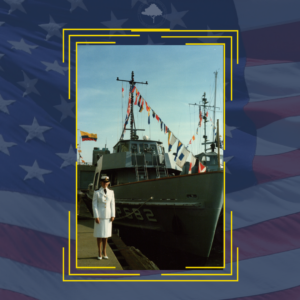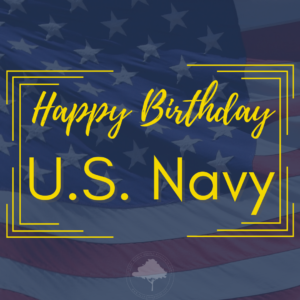As we wish the Navy happy birthday today, it seems appropriate to talk about the use of maritime culture help to increase our understanding of several Biblical stories and principles since the Bible.
How Maritime Culture Helps us Understand the Bible
by Kristin Goodrich
Blue of the mighty deep, Gold of God’s great sun;
Let these our colors be, Till All of time be done, done, done, done;
On seven seas we learn, Navy’s stern call:
Faith, courage, service true, With honor over, honor over all.
-Lyrics from “Anchors Aweigh”
 Did you know that ancient anchors were generally made by attaching a rope to a rock? Dropping the rock overboard was an attempt to keep vessels steady in a particular position. The bigger the vessel, the bigger the rock needed to be – and the harder to attach a rope to a rock. Over time anchors added metal cages for the rocks, and chained links became metal cables instead of ropes. Later, seafaring Dutch sailors spoke of wegan, translated to “lifting” the anchor from the seabed which meant that the vessel was now in motion and underway. From this old Dutch verb, we have the nautical term, “Anchors Aweigh!”
Did you know that ancient anchors were generally made by attaching a rope to a rock? Dropping the rock overboard was an attempt to keep vessels steady in a particular position. The bigger the vessel, the bigger the rock needed to be – and the harder to attach a rope to a rock. Over time anchors added metal cages for the rocks, and chained links became metal cables instead of ropes. Later, seafaring Dutch sailors spoke of wegan, translated to “lifting” the anchor from the seabed which meant that the vessel was now in motion and underway. From this old Dutch verb, we have the nautical term, “Anchors Aweigh!”
Life in the Storm
The apostle Paul uses the entire 27th chapter in the Book of Acts to describe a perilous journey from Sidon, Lebanon across the Mediterranean Sea to Italy. In verse 13, the sailors “weighed anchor and sailed along Crete, close to the shore,” in an attempt to make progress safely. Shortly thereafter in Acts 27:14-15,
[A] tempestuous wind, called the northeaster, struck down from the land. And
when the ship was caught and could not face the wind, we gave way to it and
were driven along.
Because the storm was so fierce and the ship’s sails were ineffective, the 276 persons aboard the ship endured dark, stormy weather for two weeks. Finally sensing a break in the weather and the possibility of nearing a shoreline, the sailors let down four anchors in hopes that they would remain close to shore while avoiding the rough surf near the shore.
Imagine the fear and uncertainty every soul was experiencing at that moment. Exhaustion from trying to stay aboard the ship while bailing water to keep the ship afloat. Confusion in trying to keep track of days and nights, with no idea how long the storm would last. Terror at looking at the wild waves crashing on sharp rocks, and wondering if anyone will survive. And for those who couldn’t swim, perhaps a resignation that making it to the beach would be impossible.
The Lord led Paul to cast off the anchors to the bottom of the sea, loosen the ropes on the rudders allowing for freer navigation, and run the vessel aground – all with the certainty that God would bring everyone ashore safely.
But God…
Today, we experience stormy seas in everyday life and thankfully, we have an anchor that is stronger than one that may rest on the seabed. When we need a place of refuge or a safe harbor, let us be encouraged “to hold fast to the hope set before us. We have this as a sure and steadfast anchor of the soul.” (Heb. 6:13b-14a, ESV)
Placing our faith in God’s eternal anchor of the soul rather than a temporary anchor of rock, rope, or metal gives us the hope that weathers every storm. Thanks be to our Eternal Father that we can cry out in prayer for his ever-present help in times of trouble.
Happy birthday to the US Navy. Thank you for the lessons learned, the adventures had, and the wisdom gained… even in the storms.
Eternal Father, strong to save,
Whose arm hath bound the restless wave,
Who bidd’st the mighty ocean deep
Its own appointed limits keep,
O hear us when we cry to thee
For those in peril on the sea!
-Eternal Father, Strong to Save (The Navy Hymn)

Are you a woman in uniform or a veteran?
Be sure to check out our articles for uniformed women here.
You can connect with other amazing military women and wives on our Facebook page.





